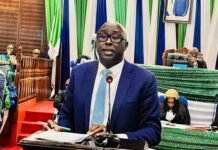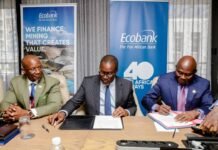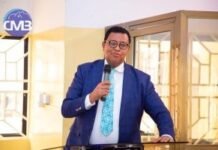By Amin Kef Sesay
The Honorable Vice President of the Republic of Sierra Leone, Dr. Mohamed Juldeh Jalloh, on Friday July 12, 2024 engaged with a cross-section of Sierra Leoneans in London during a meeting held at the Strand Palace Hotel in London.
Addressing the attendees, Vice President Jalloh discussed the ongoing efforts of the Government under President Julius Maada Bio to elevate Sierra Leone both domestically and internationally. He acknowledged the challenges faced but highlighted the significant strides made in education, healthcare and agriculture, emphasizing the Human Capital Development vision championed by President Bio.
Prior to the meeting, Vice President Jalloh met with Sierra Leone High Commissioner, Dr. Morie Manyeh and the staff at the Sierra Leone High Commission on Eagle Street. They discussed strategic engagements to strengthen Sierra Leone-UK relations, sharing insights and receiving suggestions on deepening bilateral ties with a long-standing and trusted global partner.
During his address at the Strand Palace Hotel, the Vice President spoke on the global challenges posed by the COVID-19 pandemic and the Ukraine war, which have impacted all sectors worldwide. Despite these challenges, Sierra Leone has made commendable progress in education, healthcare and agriculture. He highlighted the Government’s massive education drive benefiting approximately 2.7 million children, investments in healthcare and initiatives promoting women’s and children’s rights.
Dr. Jalloh detailed the Government’s efforts to subsidize essential services and commodities such as electricity, rice and petroleum products. He emphasized the priority given to social infrastructural development, as evidenced by the significant increase in the education budget to 22% of GDP and the healthcare budget from 6% in 2018 to 11.2% currently.
He also addressed the financial burden borne by the Government to shield the population from economic hardships, including subsidies on electricity and communication tariffs. Significant improvements in healthcare, such as reduced child and maternal mortality rates and partnerships with organizations like UNICEF, were also noted.
Agriculture and education remain top priorities, with increasing enrollment in schools and universities, particularly among female students in science fields. Government support extends to technical and vocational training, aiming to equip young people with practical skills.
The international community has recognized Sierra Leone’s progress, highlighted by President Bio’s co-chairing of the global educational transition with the UN Secretary-General and Sierra Leone’s chairmanship of the C-10 at the United Nations. Vice President Jalloh emphasized the strategic importance of strengthening global relations to achieve tangible results. He mentioned the establishment of a French diplomatic station in Freetown, enabling Sierra Leoneans to obtain French and Schengen visas locally.
Dr. Juldeh Jalloh assured the audience of the Government’s commitment to maintaining currency stability and fostering a conducive environment for business growth. He outlined initiatives like the National Investment Board to remove obstacles to business in Sierra Leone and provide incentives for business growth. The Vice President also elaborated on the FEED SALONE program, aimed at achieving food self-sufficiency and reducing dependency on food imports.
He highlighted the Gender Equality and Women’s Empowerment (GEWE) Act and internationally acclaimed efforts to combat discrimination and violence against women and girls. Developments in the rising tourism sector were also discussed, along with challenges such as the high cost of travel to Sierra Leone and efforts to attract more airlines.
Dr. Juldeh Jalloh concluded by expressing gratitude to the diaspora for their vital support and encouraged their continued efforts. He praised the resilience and tolerance of Sierra Leoneans and emphasized the importance of national cohesion.
The session included questions from various sectors, including charity organization executives and heads of school associations in the UK. Discussions focused on reducing overhead costs for local NGOs and easing the process of clearing goods at the port in Freetown. The Vice President provided contact information for relevant Government officials and promised follow-ups on the issues raised.
The event concluded with an engaging and productive session, with representatives from the Sierra Leonean community in the UK interacting with the Vice President for group and individual photos and informal chats.




